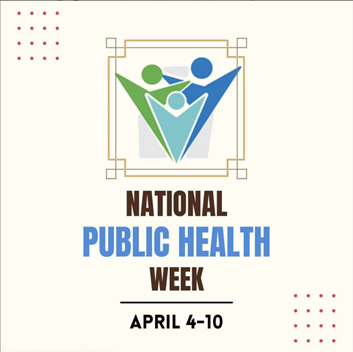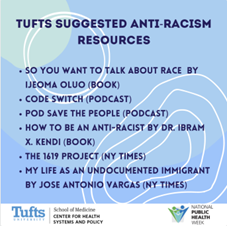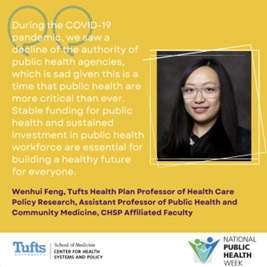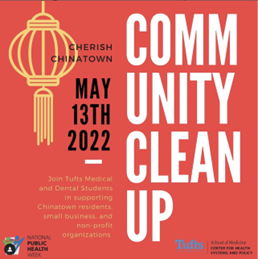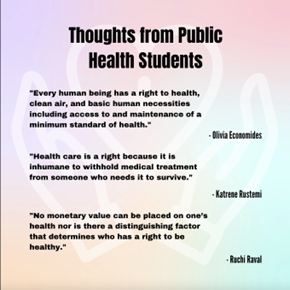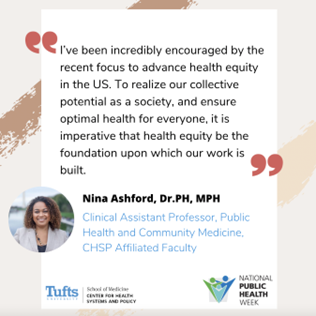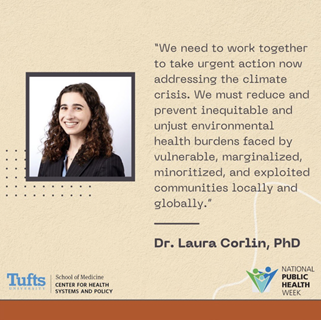Highlights from National Public Health Week 2022
The Tufts Center for Health Systems and Policy took part in National Public Health Week “to recognize the contributions of public health and highlight issues that are important to improving our nation’s health.” Each day had a theme. Read on for highlights!
Monday, Day 1
Racism: A Public Health Crisis
We at the Tufts Center for Health Systems and Policy are committed to anti-racism through our work addressing racial health inequities. To learn more and get involved in racial justice movements, visit Community Health Workers Engaging in Integrated Care (COHERE) program and an Anti-Racism Resource Guide created by the Tufts Health Hirsch Library.
Tuesday, Day 2
Public Health Workforce: Essential to our Future
In a time when at least 32 states have enacted legislation restricting state or local authority over health and emergency decisions in the wake of the pandemic, it is crucial to talk about support for the health workforce. Dr. Wenhui Feng, Tufts Health Plan Professor of Health Care Policy Research, shared her thoughts on the issue.
Wednesday, Day 3
Community: Collaboration and Resilience
The Tufts Health Sciences Campus is located in Boston’s Chinatown. In the spirit of community, we encourage folks to get involved! Cherish Chinatown is a Tufts University initiative that was started in spring 2021 by dental and medical students with support from the Office of Government and Community Relations and Tisch College. The aim is to (1) educate Tufts students and employees about the history and cultural importance of Boston’s Chinatown and to (2) organize community engagement opportunities that support Chinatown residents, small businesses, and non-profit organizations in conjunction with Chinatown leaders.
Cherish Chinatown is hosting a community cleanup on May 13th, 2022. The whole Tufts Health Science campus community is invited to volunteer for a 2-hour shift, rain or shine! Sign up here!
Thursday, Day 4
World Health Day: Health is a Human Right
Tufts Public Health students shared their thoughts on why they think health is a human right. In Dr. Atul Gawande’s New Yorker article, “Is Health Care a Right?”, he reflects on the politically divisive issue. “Progress ultimately depends on whether we can build and sustain the belief that collective action genuinely results in collective benefit.”
Friday, Day 5
Accessibility: Closing the Health Equity Gap
We featured Dr. Nina Ashford who has advanced health equity across a diverse set of public health content areas over the past 16 years. She spent 11 years working at the Centers for Medicare and Medicaid Services (CMS) where she led her team to address health equity through CMS Innovation Center models. They pushed America’s largest health care payer to understand its responsibility to address the social determinants of health, which are responsible for 80% of an individual’s health care outcomes. Dr. Ashford provided leadership and oversight for the Accountable Health Communities (AHC) Model which catalyzed action across health care payers around the country to identify innovative approaches to screen and resolve their beneficiaries’ SDOH needs.
Saturday, Day 6
Climate Change: Taking Action for Equity
Dr. Laura Corlin, Assistant Professor at Tufts School of Medicine in the Department of Public Health and Community Medicine, embodies Saturday’s theme of Climate Change and Equity. Dr. Corlin conducts exposure assessments and environmental epidemiology research seeking to mitigate environmental health disparities. You can follow her work through her twitter @DrCorlin or by looking into the LEEFE (Leverage Environmental Epidemiology for Equity) Lab!
Sunday, Day 7
Mental Wellness: Redefining the Meaning of Health
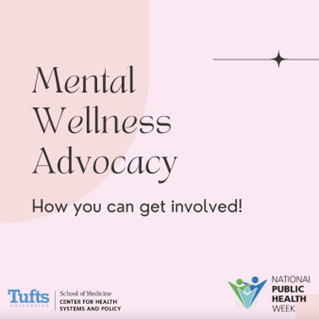
We closed out National Public Health Week by highlighting several organizations that are taking action against the stigma of mental health and advocating for mental health policy action.
- National Alliance on Mental Illness (NAMI) is the largest national grassroots organization dedicated to advocating for mental health related policy and action. Get involved by joining a NAMI Walk, participating in awareness events, or becoming a fundraiser!
- Black Emotional and Mental Health Collective (BEAM) Organization promotes Black mental health wellness and emotional healing through education, community building, and advocacy. BEAM offers training workshops for Black communities to learn about mental health, emotional healing, and peer support along with programs focused on specific aspects of the Black experience, such as support space for LGBTQ+ Black people, addressing Black masculinity, and space for Black healing professionals
- Child Mind Institute is an independent non-profit dedicated to advancing research into child and adolescent mental illness, providing educational materials, reducing stigma, and helping families find treatment. Donate, share their outreach materials, and connect on social media to help fight the stigma of mental health.
- The Yellow Tulip Project is a youth-driven advocacy organization dedicated to reducing the societal stigma of mental health through outreach and education initiatives. Students of all ages and educators can become an advocate for mental health through their ambassador program. Other ways to get involved are to join their education programs and community events, which you can bring to your own school or community!
